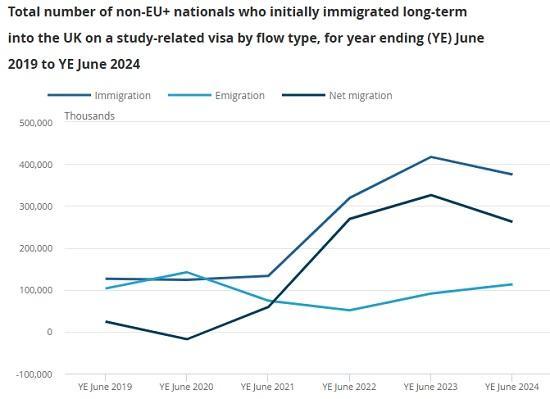Reason For International Migration, International Students Update: November 2024
28th November 2024

Long-term net migration of non-EU+ international migrants who initially arrived in the UK on a study-related visa decreased to 262,000 for year ending (YE) June 2024 compared with our updated YE June 2023 estimates of 326,000, but this remains higher than five years ago (YE June 2019).
Emigration of non-EU+ migrants who initially arrived on a study-related visa increased from 51,000 in YE June 2022 to 113,000 in YE June 2024. This includes those who emigrated but had transitioned onto a different visa type during their time in the UK.
More non-EU+ students and their dependants have been staying longer, and nearly 1 in 2 transitioned to a different visa type after three years from YE June 2021; an increase from 1 in 10 after three years from YE June 2019.
There was an increase in the number of those arriving on a study-dependant visa, particularly those of Nigerian, Pakistani and Bangladeshi nationality, since YE June 2019 until YE June 2023; however, the number of dependants immigrating decreased in YE June 2024 following government policy changes.
The proportion of study to study-dependant visas varies substantially between nationalities, particularly for YE June 2023 arrivals; overall 55% of Nigerian study-related visas were dependants compared with 1% of Chinese nationality.
Estimates for YE June 2021, YE June 2022 and YE June 2023 have been updated in line with revisions to long-term international migration; YE June 2024 estimates are provisional and are subject to revision in future publications, as assumptions about length of stay or departure are replaced by actual data.
Net migration for those initially arriving on a study-related visa for year ending (YE) June 2024 is estimated at 262,000. This is lower than YE June 2023 and YE June 2022 for which our revised estimates are 326,000 and 269,000. However, this is still over nine times higher than YE June 2019 when net migration was estimated at 24,000.
Emigration of international students and their dependants has been increasing from YE June 2022 to YE June 2024. It increased by 62,000 from 51,000 to 113,000. Furthermore, since YE June 2023, there is a decrease in the immigration of those who initially arrived on a study-related visa. Following higher numbers of international migrants who immigrated on a study-related visa after the coronavirus (COVID-19) pandemic, and given that in the past the majority of international students arrive, study, then leave, the recent increase in emigration would be expected.
However, immigration for those arriving in the UK on a study-related visa increased from 126,000 in YE June 2020 to 417,000 in YE June 2023. This previous increase in immigration was partly because of the increase in the number of student dependants arriving since 2019. There was an increase of 108,000 student dependants arriving between YE June 2019 and YE June 2023.
The increase in the number of international students and their dependants arriving on a study visa in recent years can be attributed to post-pandemic recovery, the UK exit from the EU and changes in how universities attract international students. On 16 March 2019, the Department for Education and Department for International Trade launched the International Education Strategy. The ambitions of this strategy were to increase the total number of international students choosing to study in the UK higher education system each year to 600,000 by 2030; this figure was passed in 2020 to 2021.
Despite this increase, the number of dependants immigrating in YE June 2024 decreased by 36,000 from 115,000 in YE June 2023, to 80,000 in YE June 2024. For further information on the split between study and study-dependant visas, see our Provisional long-term international migration dataset.
In May 2023 government policy changes were announced which mean that international students can no longer bring dependants on all but postgraduate research courses, and courses with government-funded scholarships. These policy changes came into effect on 1 January 2024. However, as most courses start in the autumn, student arrivals in the first six months of year tend to be relatively low. The impacts of this policy change are more likely to be reflected in data from July 2024 onwards.
Home Office monthly monitoring of entry clearance visa applications show that applications in January to October 2024 for a study visa were 16% lower than in January to October 2023. There were 85% fewer applications from dependants of students in January to October 2024 than in the same time period in 2023. This can be attributed to the dependant policy change, but until we have data from January 2025 we will not have a full year of data post-policy change. This is needed to see its complete impact.
Read the full ONS report HERE
